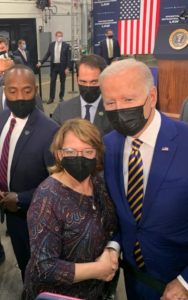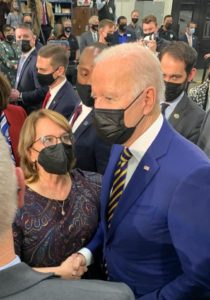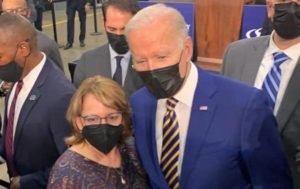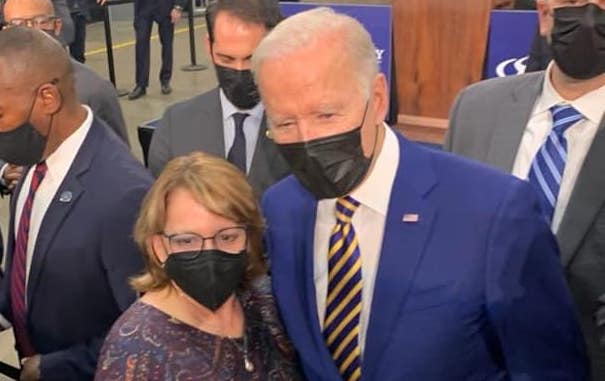ROSEMOUNT – President Joe Biden Stopped by Minnesota today to talk about the new bipartisan infrastructure law focused on improving roads, bridges, and public transportation throughout the United States. Representative Connie Bernardy, the Minnesota House Higher Education Finance and Policy Chair was there to meet him.

Rep. Connie Bernardy meets President Joe Biden
President Biden ran for our nation’s highest office, believing the only way to move our country forward is through compromise and consensus. Yesterday, joined by Members of Congress and a diverse group of leaders who fought for its passage, he signed the Bipartisan Infrastructure Deal into law.
The Bipartisan Infrastructure Deal is a monumental step forward in building back better from the pandemic. It will repair and rebuild the nation’s roads and bridges while strengthening resilience to climate change and creating good-paying, union jobs.
The Bipartisan Infrastructure Deal will:
-
- Start to replace 100% of the nation’s lead pipes and service lines, so every American and every child can turn on the faucet and drink clean water – and tens of thousands of plumbers and pipefitters will get to work in good-paying jobs.
- Make high-speed internet affordable and available everywhere in America – urban, suburban, and rural – and create jobs laying down the broadband lines.
- Make the most significant investment in passenger rail in the past 50 years and in public transit – ever, meaning Americans will be safer and get where they’re going faster.
- Modernize our ports, airports, and freight rail — to make it easier for companies to get goods to market, reduce supply chain bottlenecks we’re experiencing now, and lower costs for working families.
- Build up our resilience for the next superstorm, drought, wildfire, and hurricane. It builds back our bridges, water systems, power lines, and levees – better and stronger. So fewer Americans will be flooded out of their homes or lose power for days and weeks after a storm hits.
- For the first time ever, create an actual national network of charging stations for electric vehicles, so you can charge up and drive across the country – creating thousands of jobs for electrical workers.
- Make it possible for America to get off the sidelines and into the game on manufacturing; solar panels, wind turbines, and batteries. It will enable us to store energy and power for electric vehicles, including electric school buses – which will mean millions of our children will no longer inhale dangerous exhaust from diesel school buses.
- And, it will reward companies for paying good wages and buying American – sourcing their products from right here in America.
President Biden ran rebuilding the backbone of this nation — working people and the middle class. The Bipartisan InfrastructurDeal

Rep Connie Bernardy with President Joe Biden
delivers on that long overdue promise. It will rebuild the economy from the bottom up and middle out and better jobs for millions of Americans.
And no one earning less than $400,000 a year will pay a single penny more in federal taxes.
Thanks to the Bipartisan Infrastructure Deal, next year will be the first year in 20 years where America’s infrastructure investments will grow FASTER than China’s. With the investments in this bill, America will be on track to lead the world into the 21st century – with modern cars and trucks and transit systems.
And, together with the Build Back Better Act – millions of lives will be changed for the better.
The Bipartisan Infrastructure Deal Delivers for Minnesota
The need for action in Minnesota is clear and recently released state-level data demonstrates that the Infrastructure Investment and Jobs Act will deliver for Minnesota. For decades, infrastructure in Minnesota has suffered from a systemic lack of investment. In fact, the American Society of Civil Engineers gave Minnesota a C grade on its infrastructure report card. The historic Infrastructure Investment and Jobs Act will make life better for millions of Minnesota residents, create a generation of good-paying union jobs and economic growth, and position the United States to win the 21st century. Specifically, the Infrastructure Investment and Jobs Act will:
- Repair and rebuild our roads and bridges with a focus on climate change mitigation, resilience, equity, and safety for all users, including cyclists and pedestrians. In Minnesota there are 661 bridges and over 4,986 miles of highway in poor condition. Since 2011, commute times have increased by 8.6% in Minnesota and on average, each driver pays $543 per year in costs due to driving on roads in need of repair.
- Based on formula funding alone, Minnesota would expect to receive $4.5 billion for federal-aid highway apportioned programs and $302 million for bridge replacement and repairs under the Infrastructure Investment and Jobs Act over five years. Minnesota can also compete for the $12.5 billion Bridge Investment Program for economically significant bridges and nearly $16 billion of national funding in the bill dedicated for major projects that will deliver substantial economic benefits to communities.
- Improve healthy, sustainable transportation options for millions of Americans. Minnesotans who take public transportation spend an extra 49.8% of their time commuting and non-White households are 2.8 times more likely to commute via public transportation. 11% of trains and other transit vehicles in the state are past useful life.
- Based on formula funding alone, Minnesota would expect to receive $820 million over five years under the Infrastructure Investment and Jobs Act to improve public transportation options across the state2.
- Build a network of EV chargers to facilitate long-distance travel and provide convenient charging options. The U.S. market share of plug-in electric vehicle (EV) sales is only one-third the size of the Chinese EV market. The President believes that must change. The bill invests $7.5 billion to build out the first-ever national network of EV chargers in the United States and is a critical element in the Biden-Harris Administration’s plan to accelerate the adoption of EVs to address the climate crisis and support domestic manufacturing jobs.
- Under the Infrastructure Investment and Jobs Act, Minnesota would expect to receive $68 million over five years to support the expansion of an EV charging network in the state3. Minnesota will also have the opportunity to apply for the $2.5 billion in grant funding dedicated to EV charging in the bill.
- Help connect every American to reliable high-speed internet. Broadband internet is necessary for Americans to do their jobs, to participate equally in school learning, health care, and to stay connected. Yet 12% of Minnesota households do not have an internet subscription, and 1.5% of Minnesotans live in areas where, under the FCC’s benchmark, there is no broadband infrastructure. Under the Infrastructure Investment and Jobs Act, Minnesota will receive a minimum allocation of $100 million to help provide broadband coverage across the state, including providing access to the at least 83,000 Minnesotans who currently lack it. And, under the Infrastructure Investment and Jobs Act, 1,071,000 or 18.9% of people in Minnesota will be eligible for the Affordability Connectivity Benefit, which will help low-income families afford internet access.

Biden touts infrastructure law in first Minnesota visit as president


